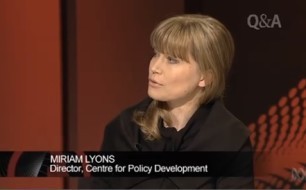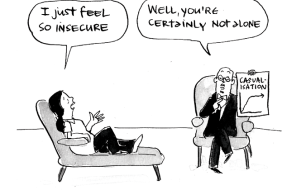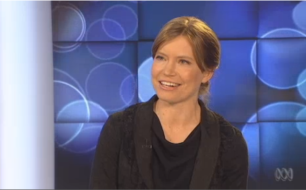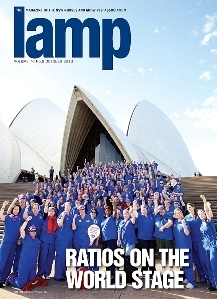Centre for Policy Development's Blog, page 60
November 2, 2013
Too many ports in a storm | OCCASIONAL PAPER
CPD dips a toe into Great Barrier Reef waters, asking what really drives the ‘ad hoc’ expansion of ports along Queensland’s coast.
Too many ports in a storm provides a comprehensive overview of the perverse incentives and weaknesses in Queensland’s current approach to port development. As the mining investment boom turns to bust, Queensland’s port capacity has already shifted from a shortfall to a surplus. Coal ports are operating at 65 per cent capacity, well below the industry average of 85 per cent. Duplication of liquefied natural gas (LNG) ports on Curtis Island are dragging down industry competitiveness before the first exports flow. This puts Queensland at a competitive disadvantage in the short-term, and at risk of stranded assets in the long-term. With investment banks now forecasting slow global thermal coal demand, Queensland has enough current and committed port capacity until at least 2017. Even with more optimistic projections for export growth, Queensland has enough approved port capacity until at least 2025. This means no further port approvals need to be decided before 2020. The report finds surplus port capacity is a problem for the Queensland Government, not just the private sector. With industry under financial pressure, employment and environmental standards may slip. Stranded assets would put jobs and government revenue at risk. Dredging for port capacity that may not be needed has significant environmental costs. The underlying problem is that Queensland’s boom-time policy settings and government attitudes have served to amplify rather than check the irrational exuberance of private investors. Too many ports in a storm provides a checklist of 5 practical steps Queensland’s government can take to address the perverse incentives, inadequate information and confused governance that led to current surplus port capacity.
Download (CPD OP 32) Too Many Ports in a Storm by Laura Eadie

October 30, 2013
AEGN 2013 Annual Conference | 29-31 October, Melbourne
 Capacity in this critical decade
Capacity in this critical decadeThe Australian Environmental Grantmakers Network is holding their 2013 Annual Conference in Melbourne. This year CPD’s executive director Miriam Lyons will be joining an expert panel on ‘Politics, policy and environmental philanthropy‘ with John Hewson, Rob Purves and Michelle Grady. They will discuss what challenges and issues the environment faces and how can philanthropy address them?.
“We often hear that we are in the critical decade for the health and future of our environment and the systems it supports. But are we ready for the opportunities this presents? Who are our eNGO partners and are they equipped to take on this decade? Do we have the leadership required to take us on this journey?”

W
HERE
Treetops, Melbourne Museum
WHEN
Tuesday 29 – Thursday 31 October 2013
DETAILS & REGISTRATION
*Please note this event is for grantmakers, not open public

October 25, 2013
Getting the facts right on Solar | SNEAK PREVIEW 25 October
CPD challenges the view that solar consumers are cross-subsidised. An upcoming report reveals households installing air-conditioning increase everyone else’s bills by $75 a year. Adding rooftop solar to the network reduces bills faced by other households due to air-conditioning. The Centre for Policy Development, along with with the APVA (Australian PV Institute), quantify the real impacts of rooftop solar on other households’ bills. This shows there are more equitable and effective ways to share network costs – rather than charging solar consumers extra levies, as suggested by the Australian Electricity Market Commission. See today’s media alert.

October 16, 2013
New Matilda | 15 October 2013

Cuts to the public service could hurt efficiency
The Abbott government has continually insisted that a Rudd-Gillard government were responsible for a dramatic rise in unnecessary public servants. Although the growth rate of the Australian public service has not even kept pace with population growth or the growth of the workforce as a whole. Ian McAuley and Christopher Stone discuss the proposed cuts to the Australian public service and ask whether we are actually burdened by our administrative bureaucracy.
“There are many other productivity reforms that various commissions of inquiry have recommended for the public service, mainly through improving managerial and technical competencies, and through removing some of the shackles that have been imposed on the public service, generally covered by the term “managerialism”, including burdensome accounting requirements and petty financial controls.”
Next month Christopher Stone, CPD research director, will he release the final instalment of the False economies report series suggesting alternative methods to cuts for improving efficiency.
Read the article at New Matilda
Download part 1 and part 2 of False economies
 Help us counter evidence-free attempts to downsize and privatise our public services –
Become an Ideas Sustainer.
Help us counter evidence-free attempts to downsize and privatise our public services –
Become an Ideas Sustainer.

Working Life | 14 October 2013

Insecure jobs are costing Australians
Recent findings by Lisa Heap has shown that up to 40% of Australian homeless people are in fact working. Furthermore 40% of all working people are face with insecure work. Australia has a job market of insecure work that leaves workers with unsure hours and no guarantee of ongoing employment. In Pushing our luck Lisa explores the working crisis Australia faces with her chapter, ‘Taking the high road: a future that works for workers’.
“For those of us who believe our society should be based on fairness, equality and the health of our communities, this is a damning statistic that should act as a call to action.
In a wealthy country, such as Australia, it can’t be considered fair that a person can have a job and still not be able to secure proper housing.”
Find out more at Working Life
Order your copy of Pushing our luck today!

The Drum | 10 October 2013

Executive director Miriam Lyons joins host Julia Baird on ABC’s The Drum with Kerry Chikarovski and Jonathan Green. The panel discuss politician’s expenses under the light of recently revealed claims by MP’s from both major parties.
“Weddings, football finals or party leadership ballots – where should we draw the line on politicians’ expenses? And why do we care much more about the security of our Facebook posts than our financial transactions? And the US debt ceiling deadline draws even closer.”
Watch the episode on ABC’s The Drum

The Drum | 2 October 2013

Will Abbott’s cuts be costly?
The claim that 12,000 jobs in the public service would go under an Abbott government was widely debated during the election. Greg Jericho at ABC’s The Drum crunches the numbers to see if cuts could be made solely through attrition. Depending on the numbers the Government decides to use figures can quite easily be distorted, however eventually there will reach a point where natural attrition dries up and the cuts start saving less than expected as redundancy is the only option. Recent report, Death by a thousand cuts, by Christopher Stone also argues that cuts can harm productivity:
“across the board cuts have little impact on productivity, and can even harm it through stifling innovation from the misguided belief that innovation is driven by financial constraints. What more often happens is services are cut back – such as the ABS stopping counting job vacancies.”
Find the article at ABC’s The Drum

NUW Anti-Poverty Week | 13-19 October 2013
The National Union of Workers – Anti-Poverty Week 2013
 Poverty affects more than a million people in Australia and more than a billion people worldwide. During ‘Anti-Poverty Week’ Australians are encouraged to organise or take part in an activity that will help reduce poverty. The event aims to educate on people the causes and consequences of poverty as well as encouraging research, discussion and action to address the problems. This year Miriam Lyons and Lisa Heap will speak on Friday the 18th of October at the event in Melbourne. Miriam is the editor, and Lisa a chapter author of CPD’s recent book Pushing our luck that is full of progressive ideas focused on Australia’s future.
Poverty affects more than a million people in Australia and more than a billion people worldwide. During ‘Anti-Poverty Week’ Australians are encouraged to organise or take part in an activity that will help reduce poverty. The event aims to educate on people the causes and consequences of poverty as well as encouraging research, discussion and action to address the problems. This year Miriam Lyons and Lisa Heap will speak on Friday the 18th of October at the event in Melbourne. Miriam is the editor, and Lisa a chapter author of CPD’s recent book Pushing our luck that is full of progressive ideas focused on Australia’s future.
WHERE
Southern Cross Station, Melbourne
WHEN
Friday 18, October, 2013. 8am – 9am.
CONTACT
Emma Kerin
P: 03 9287 1872
E: ekerin@nuw.org.au
COST
This is a FREE event open to the general public
More information on the Anti-Poverty Week website with a full calendar of activities
Learn about Lisa Heap’s chapter in Pushing our luck and order your copy

Renew Economy | 2 October 2013

University of Melbourne Festival of Ideas
Miriam Lyons, executive director for CPD attended this years ‘Festival of Ideas’ hosted by the University of Melbourne. The event is about calling on big and small ideas to address society’s problems, including climate change. CPD’s recently released book Pushing our luck edited by Miriam Lyons contains the chapter ’Climate change: reconnecting politics with reality’ by John Wiseman. Miriam and John joined a panel at the Festival of Ideas titled ‘Imagine 2033: How We Achieved A Healthy and Sustainable Post-Carbon World’. Sophie Vorrath at Renew Economy outlines some of the ideas put forward from the panel:
“Miriam Lyons, the executive Director for the Centre for Policy Development, imagines an Australia where newly formed political parties like the Electric Motoring Enthusiasts Party, are helping to fund an upgrade to the smart grid.”
Read the article at Renew Economy
Order your copy of Pushing our luck

The Lamp | October 2013

Often the term efficiency is used to mean cuts, but when cuts start costing as much as they saves there is no efficiency. CPD’s research director Christopher Stone addressed the NSW Nurses and Midwives Association at their annual ‘Professional Day’ on what these ‘efficiency’ cuts really mean for the public sector. It is often short-term narrow minded thinking that politicians have when promising a reduction in the public service to increase efficiency and reduce spending.
“Christopher Stone says our public services do a lot for us and there needs to be a consideration of results as well as resources when considering privatisation or outsourcing.”
The October edition of The Lamp outlines Chris’s points; what cuts in the past have meant for public service, and the important services that are being provided. If the Liberal government goes too far with cuts there will be decline in the quality of medical services, education and infrastructure, not increased efficiency.
Read about ‘efficiency’ and ‘cuts’ in The Lamp (pages 28-29)
Or find the article at NSWNMA

Centre for Policy Development's Blog
- Centre for Policy Development's profile
- 1 follower



